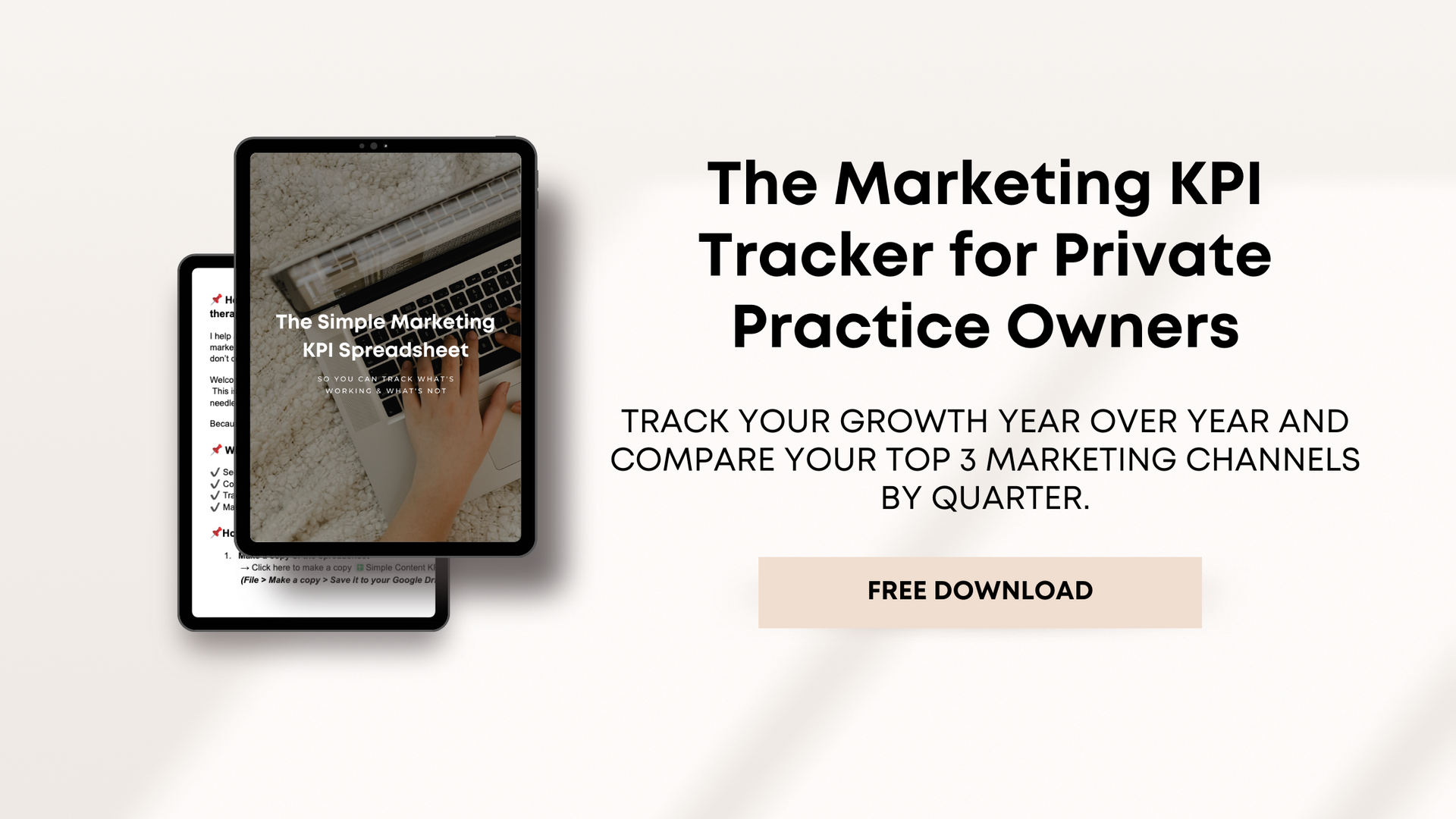The marketing KPIs every therapist should track + free tracker
You’re showing up—posting online, tweaking your Psychology Today profile, maybe even blogging here and there. But without clear feedback, it’s easy to wonder: is any of this working?
You’re not alone. Many therapists in private practice are showing up online without clear feedback about what’s helping them grow. And without real data, it’s hard to know what’s worth your time.
That’s where KPIs (Key Performance Indicators) come in. These simple metrics help you move from guessing to knowing. And when you track the right ones consistently, marketing stops feeling like a black box—it starts becoming strategic.
In case you’re new here, I’m Natalia, a website designer for therapists and practitioners. I help private practice owners like you amplify their magic, gain visibility, and simplify their marketing efforts through strategic web design and SEO content.
Let’s dive into the essential marketing KPIs every therapist should track—and how to use this free KPI & SEO tracker to make smarter decisions (without the burnout).
What is a KPI in counseling?
Think of a KPI as a compass—not a spreadsheet. It points you toward what’s actually working in your practice. It’s not about spreadsheets or corporate jargon—it’s about clarity.
Think of KPIs as a way to:
- See what’s working (and what’s not)
- Understand how people find you
- Measure growth without relying on likes or vibes
- Make aligned decisions based on facts—not pressure
You don’t need to track everything—just the right things. And the good news? You already have access to most of these numbers.
Why tracking KPIs makes marketing less overwhelming
One of the biggest reasons marketing feels so exhausting for therapists? It’s not a lack of effort—it’s a lack of direction. You’re doing the work, but without clear data, it’s hard to tell what’s actually moving the needle. That’s where KPIs come in—they help you focus your energy on what’s working, so every effort feels more intentional (and less like guesswork).
Tracking KPIs helps you:
- Identify where your best clients are coming from
- Let go of strategies that aren’t working
- Focus on platforms and tools that feel good and bring results
- Make your marketing more sustainable
It’s not about doing more—it’s about doing what works.
The most important marketing KPIs for private practice
You don’t need a complicated dashboard or a 10-tab spreadsheet. Just a handful of intentional metrics that reflect how people are finding you, connecting with your work, and deciding to reach out.
Website performance
Track how many people visit your site, how long they stay, and what they engage with.
Website traffic shows where they’re coming from—Google, Instagram, Psychology Today, etc.
Bounce rate and time on site reveal whether your message is landing or losing them. This is your cue to refine your content, layout, or offer clarity.
High-impact content
Which service pages or blog posts are getting the most attention?
These are your MVPs—the content that resonates most with your audience.
Use them as a compass to create more of what works and deepen your client journey.
Lead to client flow
How many people are reaching out—and how many are becoming paying clients?
Tracking new inquiries (via emails, DMs, or contact forms) alongside your conversion rate tells you how well your copy, intake process, and onboarding are turning interest into commitment.
Email list growth
A growing email list is a sign that your freebie is doing its job.
If people are subscribing, it means your content resonates, builds trust, and keeps them engaged beyond the first click.
Keyword visibility
Want to show up for the terms your ideal clients are actually searching for (like
“trauma therapist for teens”)?
Track how your site is ranking on Google. It’s a long-game strategy—but one of the most sustainable ways to grow.
The best marketing strategies (and tools) for therapists who want sustainable growth
Not every therapist wants to be on TikTok. And the good news? You don’t have to be.
The most effective marketing isn’t the flashiest—it’s the one that feels aligned, clear, and consistent. For most private practice owners, this means choosing just a few strategies that reflect your values and your capacity, then using the right tools to track what’s working.
Here’s what that could look like:
- A clear, trustworthy website that makes it easy for clients to understand who you are and how to start.
- An optimized Google Business Profile with accurate info, keywords, and reviews to boost local visibility.
- Thoughtful directory listings on platforms like Psychology Today, TherapyDen, or Inclusive Therapists—written for your clients, not your peers.
- SEO-friendly blog posts that quietly do the work of educating, connecting, and building trust—day after day.
- A free resource or guide that builds connection and shows your approach before someone ever reaches out.
When you pair these with intentional tracking, everything shifts. You stop guessing. You stop trying to be everywhere. You start seeing what’s actually moving the needle.
And the tools? You only need a few:
- Google Analytics to understand who’s visiting your site and what they’re doing there.
- Google Search Console to see how your site ranks and which keywords are driving traffic.
- An email platform like Flodesk or MailerLite to monitor signups and engagement.
- The KPI Tracker—your simple, therapist-friendly system to see your most important metrics at a glance.
- The Marketing Growth Hub for organizing your strategy, setting goals, and staying consistent without burning out.
The right tools make it easier to do more of what’s working—and gently let go of what isn’t.
When (and how often) should therapists review their KPIs?
You don’t need to turn KPI tracking into another to-do list. Think of it as a check-in—something that helps you realign your strategy without the pressure of doing it all the time.
For most private practice owners, reviewing your numbers monthly or at the end of each quarter is more than enough to spot patterns, measure progress, and adjust accordingly.
Try this simple rhythm:
- Revisit your current goals—What are you focused on right now?
- Choose 3–5 KPIs that reflect those goals.
- Ask yourself: What story are these numbers telling me? What’s worth continuing, shifting, or simplifying?
Tracking KPIs isn’t about perfection—it’s about paying attention. Just enough to make smarter, more grounded decisions as you grow.
Marketing doesn’t have to be a mystery
Real growth starts when you stop relying on social media validation and start trusting your data. KPIs don’t just track performance—they help you build a marketing strategy that feels grounded and aligned with your values.
You make better decisions. You stop guessing. You build a practice that works for you—not the algorithm.
KPIs aren’t just a business buzzword—they’re your path to marketing that feels aligned, intentional, and doable.
If you want a website that tracks, converts, and supports your goals behind the scenes, explore my web design services for therapists and practitioners
* AI Disclosure: This content may contain sections generated with AI with the purpose of providing you with condensed helpful and relevant content, however all personal opinions are 100% human made as well as the blog post structure, outline and key takeaways.
* Affiliate Disclosure: Some of the links on www.nataliamaganda.com may contain affiliate links meaning that I will get a commission for recommending products at no extra cost to you.

hello! i'm natalia
Latina, web design expert for mental health professionals.
I help ambitious life coaches, therapists and holistic leaders amplify their magic, gain visibility, and simplify their marketing efforts through strategic web design and content.
If you’re looking for an all-in-one system to manage your website, emails, funnels, and CRM, Go HighLevel (affiliate link) is the most powerful tool I’ve tested—and it’s built to grow with you.
On a tighter budget or just starting out? ThriveCart (affiliate link) offers a one-time payment option and easy checkout setups that still pack a punch for digital offers and automation. (Send me an email after your purchase and make sure to use my affiliate link)







